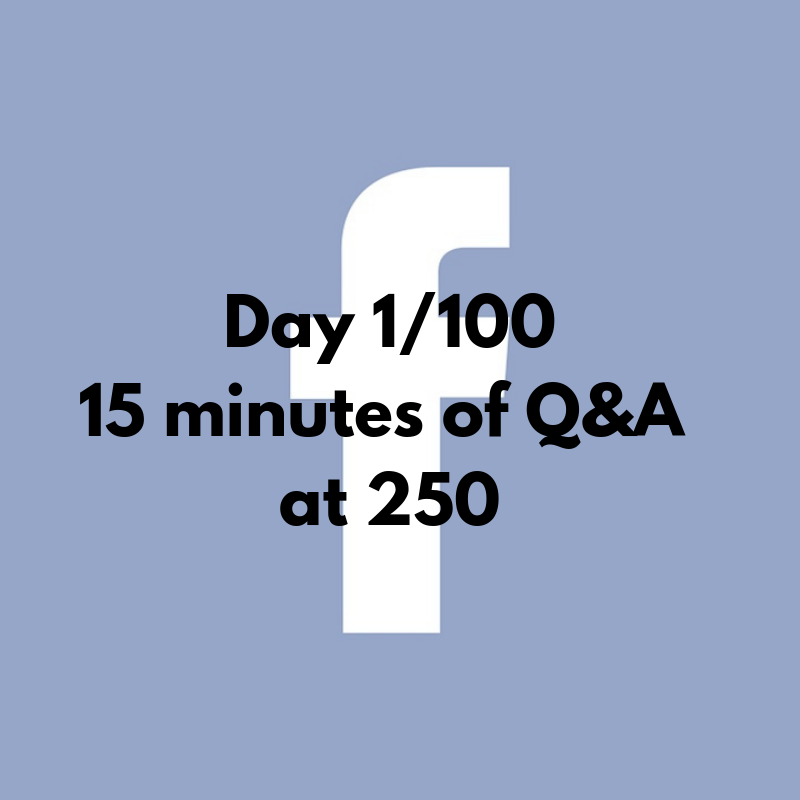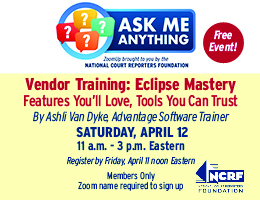
Daily practice can make a big difference. That’s not new information to any court reporter or captioner. The hard part isn’t knowing you need to practice; it’s making the time to do it.
Some reporters have found that joining a Facebook practice group helps them make it happen. A recent story in the JCR about a group led to others expressing interest in starting groups of their own. Rich Germosen, RMR, CRR, a freelance court reporter from New Brunswick, N.J., who leads a practice group, has some ideas for people who are starting their own group. Germosen’s group is a 100-day group. Members make a commitment to practice 100 days in a row, although some members have gone on longer.
“I’m not sure what made me pick 100 days, but it’s a nice round number,” he said. “It’s more than 50 days. It seems like it won’t be easy to do, and it’s not. It’s a challenge.”
Kathryn A. Thomas, RDR, CRR, CRC, a captioner from Caseyville, Ill., joined Germosen’s group to help her practice. “I joined after the [2017] Vegas convention, and I’m on my 536th day as we speak,” Thomas said. “I joined because I need increased accountability to keep up my skills. About a month after I joined, I was installed as president of the Illinois Court Reporters Association, and this is a way to ensure my skills don’t degrade amidst all the goings-on of my two-year term. I’m the type that if I go a day without writing something, I can feel it the next day, and my captioning consumers don’t deserve that.”
Start off with a public Facebook group while you attract members. When you have the right number, you can make the group secret. Too many members will make the group unmanageable.
“If I have 200 or 300 folks participating, it would be a full-time job,” Germosen said. “So if you’re looking to build it up, make it public and they will come.”
Germosen says 100 is a good number of members for the group. That’s a small enough number that the moderator can recognize all of the members, and they can be a close-knit group. He was the only moderator for his group for a long time, but he has recently added another person.
Members of the group are promising to practice every day and post about it when they do. The moderators are paying attention to who is practicing and who isn’t.
“We are on the honor system,” Germosen says. “I take their word for it that they say they are on day X. I do audit folks from time to time just to make sure their days are adding up if I notice unusual numbers in their posts. Some folks drop off at day 3. I’ll keep an eye on them and hope they jump into it by week 6 or so before removing them. There is a way to sort the members list by join date. You can scroll that list and see if a member has been silent or hasn’t been posting because it’ll show ‘three recent posts’ or ‘five recent posts.’ This will show next to the member’s name. I look at this and check on folks with no activity to see if they’ve been posting. Then I may remove them if it’s been several weeks.”
Thomas said seeing the practice posts definitely motivates her. “I thought it would be harder to remember to do daily practice, especially over the holidays,” she said. “But when I see group members post their practice on Christmas Day, Thanksgiving, etc., it reminds me.”
Moderators might also want to recognize milestones such as one week, two weeks, 100 days, etc. “I’ll reply with a picture of a funny cartoon on day seven,” Germosen said. “If you’re on day 14, I’ll reply with a pic that says ‘Week 2,’ and same for week three. For day 27, I’ll reply with a Yankees 27 banner. For day 50, you get one of a series of ‘half’ pics; then once you’re on day 90 I’ll post a link to Europe’s ‘The Final Countdown’ song, and then day 100 I’ll post any series of ‘100 Day Club’ pics or banners and put them on ‘the finishers’ list,’ which is a list I have of all finishers going back to 2014 and the date they finished.”
Germosen said one rule is that everyone needs to be supportive of everyone else in the group. As admin, he likes everyone’s Facebook practice posts and keeps the page free of drama. He said it’s also important for the admin to set the example with practicing. No slacking.
Thomas agrees about the supportive nature of the group, “It’s brought me closer to the individuals in the group itself, and it’s wonderful to celebrate together as they win or qualify for contests around the nation,” she said. “Occasionally someone will recommend a TED talk to the group to practice, and I’ve learned some things through practicing those.”
“What the page does is you see others posting, and you think to yourself that you should be practicing too,” Germosen said. “It’s nice to have a community around you of others doing the same thing you’re doing … trying to improve.”













